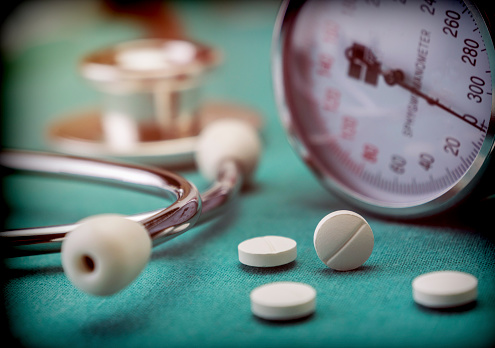Simple lifestyle changes can help reduce high blood pressure, although some people may need to take medicine as well.
Your GP can advise you about changes you can make to your lifestyle and discuss whether they think you'd benefit from medicine.
When treatment is recommended
Everyone with high blood pressure is advised to make healthy lifestyle changes.
Whether medicine is also recommended depends on your blood pressure reading and your risk of developing problems such as heart attacks or strokes.
Your doctor will carry out some blood and urine tests, and ask questions about your health to determine your risk of other problems:
- if your blood pressure is consistently above 140/90mmHg (or 135/85mmHg at home), but your risk of other problems is low – you'll be advised to make some changes to your lifestyle
- if your blood pressure is consistently above 140/90mmHg (or 135/85mmHg at home) and your risk of other problems is high – you'll be offered medicine to lower your blood pressure, in addition to lifestyle changes
- if your blood pressure is consistently above 160/100mmHg – you'll be offered medicine to lower your blood pressure, in addition to lifestyle changes
Lifestyle changes
There are some changes you could make to your lifestyle to reduce high blood pressure.
Some of these will lower your blood pressure in a matter of weeks, while others may take longer.
Try to:
- cut your salt intake to less than 6g (0.2oz) a day, which is about a teaspoonful
- eat a low-fat, balanced diet – including plenty of fresh fruit and vegetables;
- be active
- cut down on alcohol – get tips on cutting down, including downloading a drinks diary and keeping track of your drinking
- lose weight – find out what your ideal weight is using the BMI healthy weight calculator and read advice about losing weight if you're overweight
- drink less caffeine – found in coffee, tea and cola
- stop smoking
You can take these steps today, regardless of whether or not you're taking blood pressure medicines.
In fact, by making these changes early on you may be able to avoid needing medicines.
What is the first drug of choice for hypertension?
Medicines for high blood pressure
Several types of medicine can be used to help control high blood pressure.
Many people need to take a combination of different medicines.
- if you're under 55 years of age – you'll usually be offered an ACE inhibitor or an angiotensin-2 receptor blocker (ARB)
- if you're aged 55 or older, or you're any age and of African or Caribbean origin – you'll usually be offered a calcium channel blocker
You may need to take blood pressure medicine for the rest of your life. But your doctor might be able to reduce or stop your treatment if your blood pressure stays under control for several years.
It's really important to take your medicine as directed. If you miss doses, it will not work as well.
The medicine will not necessarily make you feel any different, but this does not mean it's not working.
Medicines used to treat high blood pressure can have side effects, but most people do not get any.
If you do get side effects, do not stop taking your medicine. Talk to your doctor, who may advise changing your medicine.
ACE inhibitors
Angiotensin-converting enzyme (ACE) inhibitors reduce blood pressure by relaxing your blood vessels.
The most common side effect is a persistent dry cough.
Angiotensin-2 receptor blockers (ARBs)
ARBs work in a similar way to ACE inhibitors. They're often recommended if ACE inhibitors cause troublesome side effects.
Possible side effects include dizziness, headaches, and cold or flu-like symptoms.
Calcium channel blockers
Calcium channel blockers reduce blood pressure by widening your blood vessels
Possible side effects include headaches, swollen ankles and constipation.
Drinking grapefruit juice while taking some calcium channel blockers can increase your risk of side effects.
Diuretics
Sometimes known as water pills, diuretics work by flushing excess water and salt from the body through your pee.
They're often used if calcium channel blockers cause troublesome side effects.
Common examples are indapamide and bendroflumethiazide.
Possible side effects include dizziness when standing up, increased thirst, needing to go to the toilet frequently, and a rash.
You might also get low potassium and low sodium after long-term use.
Beta blockers
Beta blockers can reduce blood pressure by making your heart beat more slowly and with less force.
They used to be a popular treatment for high blood pressure, but now tend to be used only when other treatments have not worked.
This is because beta blockers are considered less effective than other blood pressure medicines.
Common examples are atenolol and bisoprolol.
Possible side effects include dizziness, headaches, tiredness, and cold hands and feet.
What is the safest blood pressure medicine for the elderly?
High blood pressure in older people
The target blood pressure reading for the over-80s is below 150/90 mmHg when it's measured in the clinic or surgery, and below 145/85 mmHg for home readings.
While there are definite benefits from taking medicines to reduce blood pressure if you're under the age of 80, it's less clear it's useful if you're over 80.
It's now thought that if you reach 80 while you're taking medicine for high blood pressure, it's fine to continue treatment provided it's still helping you and is not causing side effects.
If you're diagnosed with high blood pressure and you're aged over 80, your doctor will also consider your other health risk factors when deciding whether to give you treatment for the high blood pressure.











